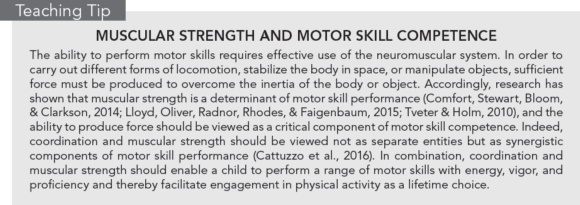The language of movement
This is an excerpt from Essentials of Youth Fitness by Avery Faigenbaum,Rhodri Lloyd,Jon Oliver.
Although children require opportunities for experiential learning and exposure to free play in order to refine motor skill patterns, it is often mistakenly thought that children will innately develop motor skill proficiency simply as a result of growth and development. In reality, existing data show that many children are not competent in a range of motor skills (Bryant et al., 2014; Hardy et al., 2013), which increases their likelihood of living in a sedentary manner. Thus it is clear that motor skills need to be taught, and teaching effectively means using appropriate pedagogy (Logan, Robinson, Wilson, & Lucas, 2012; Palmer, Chinn, & Robinson, 2017). Although multiple factors play a role in the process of learning new skills, we should not underestimate the importance of providing developmentally appropriate instruction during childhood (Foulkes et al., 2015; Lubans, Morgan, Cliff, Barnett, & Okely, 2010). Much in the same way that children require support and guidance from teachers in order to learn to read or play a musical instrument, they also need youth fitness specialists to teach them to move correctly. Indeed, developing a vocabulary of rudimentary and fundamental motor skills early in life should be viewed as the foundation for more specialized motor skills at a later stage of development. Pedagogically, the crucial skill of the youth fitness specialist is to say the right thing to the right individual at the right time in order to foster a positive learning environment for the child, which helps guide the child toward competence in a range of motor skills.
Achievement goal theory describes the goals and attributions that individuals embrace in the learning process and that ultimately influence the way in which they approach and engage with their learning environment (Palmer et al., 2017). The literature indicates that learners typically assume either a mastery orientation or a performance orientation in regard to the process of learning (Ames, 1992; Palmer et al., 2017; Robinson, 2011a). Fostering a mastery-oriented climate to learning encourages youth to engage in learning for intrinsic value and to judge improvement against self-referenced standards (e.g., how much better is one's motor skill performance now than it was in the previous session). In contrast, a task-oriented climate leads the child to try to prove competence, avoid failure, and judge successful learning against norm-referenced standards (e.g., how much better is a child's motor skill performance than that of others in the group).
Within the education literature, research shows that adopting a mastery-oriented learning climate leads to greater intrinsic interest and more time spent on task (Butler, 1987; Meece, Blumenfeld, & Hoyle, 1988), belief in the notion that effort leads to success (Ames, 1992; Nicholls, Patashnick, & Nolen, 1985), positive attitudes toward learning (Ames, 1992), and greater resilience in the face of challenges (Elliott & Dweck, 1988). In addition, recent systematic review data have shown that adopting a mastery-oriented climate leads to improved motor skill competence in young children (Palmer et al., 2017); more specifically, studies have shown enhanced competence in object control (Robinson, 2011a; Robinson, Palmer, & Bub, 2016; L.E. Robinson, Veldman, Palmer, & Okely, 2017) and locomotive skills (L.E. Robinson et al., 2016; Robinson, Webster, Logan, Lucas, & Barber, 2012). From a holistic perspective, practitioners should promote intrinsic motivation in youth in order to encourage children and adolescents to participate, improve, and develop skills while also reducing the risk of being driven solely by external rewards such as trophies.

SHOP

Get the latest insights with regular newsletters, plus periodic product information and special insider offers.
JOIN NOW
Latest Posts
- Using double inclinometers to assess cervical flexion
- Trunk flexion manual muscle testing
- Using a goniometer to assess shoulder horizontal adduction
- Assessing shoulder flexion with manual muscle testing
- Sample mental health lesson plan of a skills-based approach
- Sample assessment worksheet for the skill of accessing valid and reliable resources


